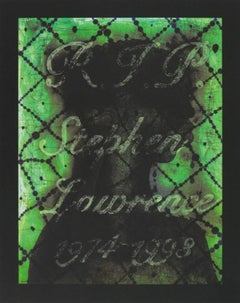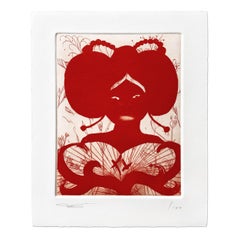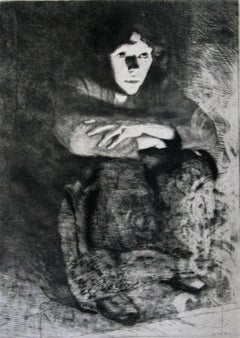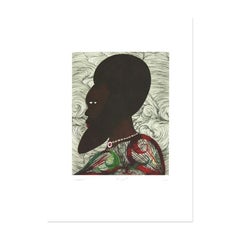Chris Ofili Portrait Prints
Chris Ofili’s earliest paintings and prints were some of his most radical, breaking boundaries and setting the tone for a lifetime of work that unapologetically explores Black identity, racism, religion and pop culture.
The Manchester-born artist made a big splash in the art world in the early 1990s, after he visited Zimbabwe at the age of 23. Deeply moved by the region’s Stone Age cave paintings, which incorporated endless (presumably) finger-painted dots, Ofili returned to his studio and infused his paintings with the exuberance of his travels — and with some of the little balls of elephant dung he saw on his trip, which he also found intriguing and brought back to England.
Ofili was a member of the Young British Artists — a collective of London-based artists that included Damien Hirst, Tracey Emin and others that never shied from using non-traditional materials or tackling controversial subject matter. He found the spotlight in the late 1990s when then-New York City mayor Rudolph Giuliani publicly criticized the artist’s monumental depiction of an eroticized black Madonna that featured elephant dung and images of female genitalia.
So it was that Ofili became, for a time, best known for his elephant dung paintings. Then, in 1998, at the age of 30, Ofili won the coveted Turner Prize — he was the first Black artist to do so — and soon afterward, in 2003, he was selected to exhibit at the 50th Venice Biennale.
Over the years, Ofili has incorporated other surprising elements into his work, including resin, glitter, beads, oil paint, and pornographic cut-outs — a rich amalgamation of textures and colors, iconography and symbols. He has also found himself surrounded by controversy, as in 1996, when he painted a Black Madonna with elephant dung on her breast, set against a background of genitalia cut out of pornographic magazines. In 2017, Ofili was awarded a Commander of the Most Excellent Order of the British Empire (CBE) in honor of his unusual and thought-provoking contributions to art.
Ofili’s work is held in the collections of some of the world’s most prominent public institutions, including the British Museum in London and the Walker Art Center in Minneapolis, Minnesota. Ofili enjoys ongoing exhibitions at prestigious museums like the Carnegie Museum of Art in Pittsburgh, Pennsylvania, the Tate in London, the Museum of Contemporary Art in Los Angeles, and the Museum of Modern Art in New York. Today, Ofili lives and works in Trinidad.
Find authentic Chris Ofili paintings, prints and other art on 1stDibs.
2010s Contemporary Chris Ofili Portrait Prints
Lithograph, Screen
21st Century and Contemporary Contemporary Chris Ofili Portrait Prints
Drypoint, Etching, Aquatint
Late 19th Century Impressionist Chris Ofili Portrait Prints
Drypoint, Etching
Early 2000s Contemporary Chris Ofili Portrait Prints
Screen, Engraving, Aquatint
1930s Modern Chris Ofili Portrait Prints
Drypoint, Etching
1980s Abstract Chris Ofili Portrait Prints
Screen
1960s Contemporary Chris Ofili Portrait Prints
Lithograph
Early 1900s Art Nouveau Chris Ofili Portrait Prints
Drypoint, Etching
1990s Contemporary Chris Ofili Portrait Prints
Lithograph
Late 19th Century Impressionist Chris Ofili Portrait Prints
Drypoint, Etching
1990s Contemporary Chris Ofili Portrait Prints
Lithograph
1980s Abstract Chris Ofili Portrait Prints
Screen
1930s American Modern Chris Ofili Portrait Prints
Drypoint, Etching
1970s Contemporary Chris Ofili Portrait Prints
Lithograph
Late 20th Century Young British Artists (YBA) Chris Ofili Portrait Prints
Lithograph, Screen
Chris Ofili portrait prints for sale on 1stDibs.
Artists Similar to Chris Ofili
- What is Chris Ofili famous for?1 Answer1stDibs ExpertJanuary 10, 2025Chris Ofili is famous for his art. His earliest paintings and prints were some of his most radical, breaking boundaries and setting the tone for a lifetime of work that unapologetically explores Black identity, racism, religion and pop culture. Ofili was a member of the Young British Artists — a collective of London-based artists that included Damien Hirst, Tracey Emin and others who have never shied from using non-traditional materials or tackling controversial subject matter. He found the spotlight in the late 1990s when then-New York City mayor Rudolph Giuliani publicly criticized the artist’s monumental depiction of an eroticized Black Madonna that featured elephant dung and images of female genitalia. So it was that Ofili became, for a time, best known for his elephant dung paintings. Then, in 1998, at the age of 30, Ofili won the coveted Turner Prize — he was the first Black artist to do so — and soon afterward, in 2003, he was selected to exhibit at the 50th Venice Biennale. Find a variety of Chris Ofili art on 1stDibs.




